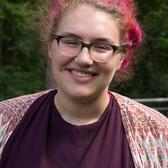How The Internet Made Me A Better Jew (Also, A Feminist)
When I was in the third grade, I told my mom that I wanted to cut off all of my hair. I wanted it gone. All of my friends were boys, and I didn’t want my hair to be the visual cue that told other people that I was any different than them anymore. Explaining why I didn’t hang out with the girls was exhausting, and I figured that by stripping myself of long hair, I would be securing my place as “one of the guys.” I wanted to be an integral part of their community, and that desire to be connected to other people continued to be a driving force in my life. That desire to belong to an overarching community is ultimately what brought my Judaism and feminism together; now fused at the hip, separation has ceased to be an option.
My friend’s dad used to tell me, “Wherever you go, someone’s always Jewish.” No matter where you are, you can always find someone with an embarrassing bar/bat mitzvah story, or an uncle that has a tendency to get a little too wild at the oneg (or post-service meal/general congregation get together) on Friday nights. The expansiveness of the ideology, the culture, the religion of Judaism, was (and still is) truly incredible. However, as much as I loved my Jewishness, there always seemed to be something missing. When I lived in Texas, it was a sense of modernity. The congregation was old, and the Jewish population as a whole, in my small town, was dwindling. There was a lack of inclusivity and the ideas concerning how and why to practice seemed old, or lacking in passion. When I moved to California, the missing piece was still that passion. The congregation was younger, the people were more open, but the inclusivity and reasons driving peoples’ Judaism were still lacking.
Enter: Feminism.
Enter: my freshman year English class, and the first research paper of my high school career. Until then I had only dabbled in feminism, and decided to pursue the topic as a way to educate myself and to figure out whether or not this movement was all that it was really cracked up to be. It was. I read articles about the transitional periods between first, second, and third wave feminism, and the more knowledge I gleaned, the more empowered I felt. After scrapping a rough draft that ended up being almost 100% about Bikini Kill, I focused in on writing about the role of women (as authors and people) in the Beat generation. These women were dope. They thrived in a male-dominated literary circles and overall really kicked some ass. I learned from them, and kept up with the research on the Internet, and suddenly found myself with something different than I had expected to find.
At this point in the game I was a sophomore in high school; I also had a Tumblr account, which did not bode well for my study habits but nurtured my interest in social justice, which had its roots in basic feminist theory. I was surprised to find a sense of camaraderie within a community of girls online. There were people who were interested in women’s issues and systemic oppression on the Internet, but not necessarily at my high school.
The similarities between my physical Jewish community and my virtual feminist community were shocking. I had a tangible community at home: in my synagogue, in my youth group, and within my Jewish family. The Internet, though, enabled me to feel a sense of inclusivity and passion that was missing from those circles at times. In real life, I have never been able to find the same kind of community that I’ve found online. As a Jew, the emphasis on questioning given information was one of the most preeminent aspects of my childhood. I was taught to be critical and to ask how things could work better, how different things could be looked at in different ways, and as I became more entrenched in social justice, I realized that feminism was requiring me to ask myself those same questions.
The intersection of my Judaism and my feminism happens at the four-way stop of morality, cynicism, pragmatism, and compassion. The experiences of my own Jewish peers and elders and the feminists in my life feed into each other. The history of the Jewish people drives my interest in feminism; it gives me a glimpse into the way oppressive institutions can work and how to fight them . The variety of feminist voices gives me all the more reason to look for a variety of Jewish voices. Both Judaism and feminism give me the warm fuzzy feeling that comes with feeling like you truly belong somewhere. These two aspects of my life are so closely intertwined that sometimes I can’t even tell one from the other, and I wouldn’t have it any other way.
This piece was written as part of JWA’s Rising Voices Fellowship.







